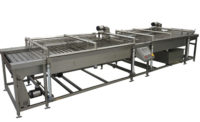![]()
Frying Technology and Practices
by Monoj K. Gupta
Frying — a key process in the manufacture of many snack products — exposes oil to high temperatures for extended periods of time. This causes hydrolysis, oxidation and polymerization in the oil. The more extensive these reactions are, the shorter the shelf life will be for the fried product.
Some oil degradation during frying is inevitable, and the extent of oil damage can be excessive. However, it is possible to minimize the oil damage in a frying operation and extend product shelf life.
First, it requires an understanding of the fundamental chemical reactions that take place in the frying process. These are:
1. Hydrolysis: In this process, an oil molecule reacts with a water molecule forming a molecule of free fatty acid and diglyceride.
2. Oxidation: In this process, the unsaturated fatty acids react with the oxygen and produce various oxidation products. Some impart good flavor to the products, while the majority of them impart an off flavor in the product as it ages in the package.
3. Constant heating and improper operation of the fryer also produces thermal decomposition products that impart bad flavor to the fried food.
4. Certain metals and other components in the food also accelerate the hydrolysis and oxidation process in the oil during frying.
5. High quality fresh oil, good oil-handling procedures, proper frying practices and appropriate packaging are essential for long product shelf life.
With the implementation of proper oil-management practices and implementation of appropriate operating practices, one can minimize the chemical reactions and improve the shelf life of the fried product. This includes management of oil quality at the oil refiner as well as at the snack food operation.
Information on how to minimize chemical reactions in oil during frying and improve the shelf life of fried foods can be found in a new reference book: “Frying Technology and Practices,” edited by Monoj K. Gupta, Pamela J. White and Kathleen Warner. Monoj K. Gupta is president of MG Edible Oil Consulting International, a SFA associate member. Information on the book, which includes information on the chemistry of oil in frying, oil selection for fried product and methods to improve the operating practices in restaurants or large-scale snack food manufacturing plants, can be found at SFA’s Web site (www.sfa.org) or by contacting Lynn Chapman at 703-836-4500 ext.203 or at lchapman@sfa.org.



